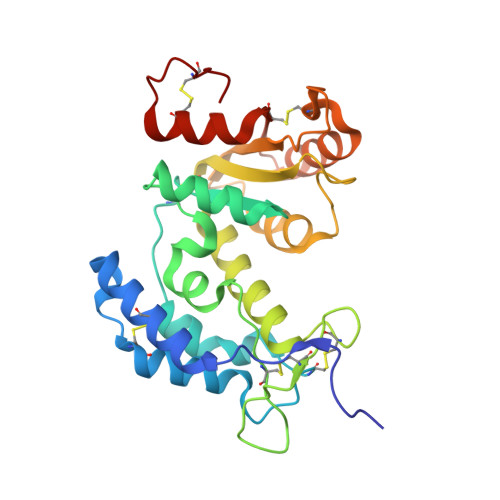Synthesis of site-specific antibody-drug conjugates by ADP-ribosyl cyclases.
Dai, Z., Zhang, X.N., Nasertorabi, F., Cheng, Q., Li, J., Katz, B.B., Smbatyan, G., Pei, H., Louie, S.G., Lenz, H.J., Stevens, R.C., Zhang, Y.(2020) Sci Adv 6: eaba6752-eaba6752
- PubMed: 32537509
- DOI: https://doi.org/10.1126/sciadv.aba6752
- Primary Citation of Related Structures:
6VUA - PubMed Abstract:
Most of the current antibody-drug conjugates (ADCs) in clinic are heterogeneous mixtures. To produce homogeneous ADCs, established procedures often require multiple steps or long reaction times. The introduced mutations or foreign sequences may cause high immunogenicity. Here, we explore a new concept of transforming CD38 enzymatic activity into a facile approach for generating site-specific ADCs. This was achieved through coupling bifunctional antibody-CD38 fusion proteins with designer dinucleotide-based covalent inhibitors with stably attached payloads. The resulting adenosine diphosphate-ribosyl cyclase-enabled ADC (ARC-ADC) with a drug-to-antibody ratio of 2 could be rapidly generated through single-step conjugation. The generated ARC-ADC targeting human epidermal growth factor receptor 2 (HER2) displays excellent stability and potency against HER2-positive breast cancer both in vitro and in vivo. This proof-of-concept study demonstrates a new strategy for production of site-specific ADCs. It may provide a general approach for the development of a novel class of ADCs with potentially enhanced properties.
- Department of Pharmacology and Pharmaceutical Sciences, School of Pharmacy, University of Southern California, Los Angeles, CA 90089, USA.
Organizational Affiliation:





















